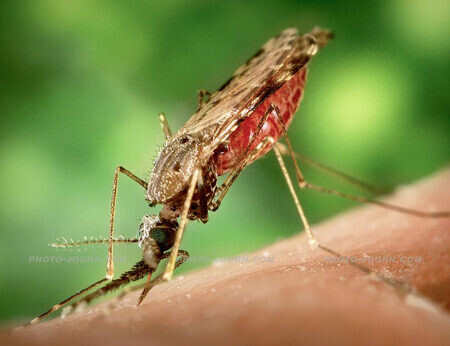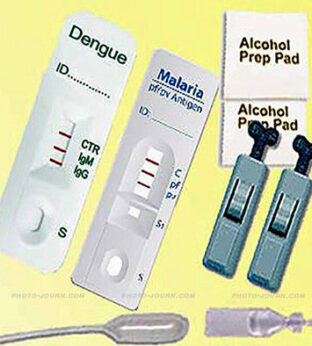Two recent studies of malaria along the Thailand-Burma border show that drug-resistant malaria in the region is increasing at an alarming rate, with one study showing a 3,335 per cent increase in the last 10 years.

The reports, Emergence of artemisinin-resistant malaria on the western border of Thailand: a longitudinal study published in The Lancet and A Major Genome Region Underlying Artemisinin Resistance in Malaria, published in the journal Science, show drug-resistant malaria is rapidly moving into new areas.
Funded by the Wellcome Trust and the US National Institutes of Health (NIH), the two research projects included scientists from Bangkok’s Mahidol University (MU), the Oxford Centre for Tropical Medicine and Global Health, and the Texas Biomedical Research Institute in the USA.
The researchers found that 42 per cent of malaria cases in western Cambodia were resistant to drug treatment, indicating that drug resistant malaria along the Thailand-Burma border is rapidly approaching the rate in Cambodia.
Researchers said malaria that was resistant to the current standard drug therapy, artemisinin, had spread more than 800km (about 500 miles) west to the Thailand-Burma border since it was confirmed in Cambodia in 2006. A study of 3,202 people who contracted malaria in the region between 2001 and 2010 found a steady increase in the time it took for the disease to be eliminated from their body‚ from 0.6 per cent of cases in 2007 to 20 per cent in 2010.
According to The Lancet, the speed with which drug-resistant malaria is growing along the Thailand-Burma border means drug-resistant malaria will reach rates equivalent to those reported in western Cambodia in between two to six years.
Of concern is a finding in the report published in Science, where researchers identified a region of the Plasmodium falciparum (P. falciparum) parasite’s genome that may be mutating in order to survive.
The study compared the genomes of 91 P. falciparum parasites from Cambodia and western Thailand with those from Lao PDR, where drug-resistant malaria has so far not emerged. It found seven genes that may be responsible for the parasites resistance to malaria treatment drugs, and which may explain the up to 35 per cent malaria drug-resistance that is occurring in Southeast Asia.
Thailand-Burma border malaria resistant to our best drugs

Leader of the study, Francois Nosten, director of the Shoklo Malaria Research Unit (SMRU), who studies and treats malaria in the Thailand-Burma border region said, “we have now seen the emergence of malaria resistant to our best drugs, and these resistant parasites are not confined to western Cambodia”.
Mr Nosten said, this is very worrying and suggests we are in a race against time to control malaria in this region before P. falciparum drug resistance worsens, develops, and spreads further.
Although the number of deaths in Africa from malaria have been decreasing in recent years due to increased artemisinin drug use and wider distribution of insecticide-treated bed nets, the World Health Organization (WHO) says an estimated 655,000 people died from the disease in 2010However, a 2010 report by the Institute of Health Metrics and Evaluation (IHME) at the University of Washington, Seattle put the figure at up to 1.2 million people.
If resistance to the artemisinin drug regimen continues to spread some specialists fear Africa could see a resurgence in drug-resistant malaria and a reversal of the inroads made in combating the debilitating and deadly disease.
While residents of malaria endemic areas are well educated in the risk, precautions, and symptoms, this does not apply equally so to travelers. The UKs Health Protection Agency (HPA) reported last year an almost 30 per cent increase in the number of Britons contracting malaria in 2009 and 2010.
Rapid malaria tests for travelers

According to the HPA report, of the 1,761 confirmed cases in 2010 and 1,495 cases reported in 2009, almost 40 per cent of Britons who contracted malaria had visited Nigeria or Ghana, while 11 per cent had been to India.
Home Kit Biotech (HKB) is an internet-based business that sells a range of instant blood screening instant test kits, including rapid instant test kits for malaria and dengue fever.
Pam Johnson, HKB customer service manager, said there was a steady demand for the company’s rapid medical test kits for travelers, which comprises a rapid Malaria instant test kit and a rapid Dengue instant test kit.
“People are increasingly traveling to and spending longer periods of time in malaria infected areas for work, as tourists, or volunteers and often there are language problems or the nearest reliable medical testing facility is hundreds of kilometers or more away.
“Our rapid medical test kits for travelers are proven to be able to detect 99.6 per cent of all positive cases (sensitivity) and 99.7% accurate at returning false positives (specificity). For less than $26 (£19.85) people can test themselves and provided they follow the instructions, receive a pretty accurate diagnosis of whether they are infected with malaria or dengue or not”.
Ms Johnson said that HKB will soon be adding a rapid chikungunya instant test to its rapid medical test kits for travelers, following increasing reports of outbreaks in Cambodia, China, and India in particular.
Feature video Al Jazeera English
Related:
He has spent extensive periods of time working in Africa and throughout Southeast Asia, with stints in the Middle East, the USA, and England.
He has covered major world events including Operation Desert Shield/ Storm, the 1991 pillage in Zaire, the 1994 Rwanda genocide, the 1999 East Timor independence unrest, the 2004 Asian tsunami, and the 2009, 2010, and 2014 Bangkok political protests.
In 1995 he was a Walkley Award finalist, the highest awards in Australian journalism, for his coverage of the 1995 Zaire (now Democratic Republic of Congo) Ebola outbreak.
Most recently he was the Thailand editor/ managing editor of AEC News Today . Prior to that he was the deputy editor and Thailand and Greater Mekong Sub-region editor for The Establishment Post, predecessor of Asean Today.
In the mid-80s and early 90s he owned JLF Promotions, the largest above and below the line marketing and PR firm servicing the high-technology industry in Australia. It was sold in 1995.
Opinions and views expressed on this site are those of the author’s only. Read more at About me
Latest posts by John Le Fevre (see all)
- Kaavan’s great escape photo special (video & gallery) – November 30, 2020
- A real life fairy tale: Cambodia provides sanctuary to Kaavan, the world’s loneliest elephant (video & gallery) *updated – November 30, 2020
- Death for corruption and press freedom abused as Thailand continues Nth Korean-like slide – July 23, 2015
- Thailand’s young rice farmers boost income, slash costs with switch to organic, AWD method – May 29, 2015

This isn’t good news. I imagine that the virus can be spread even to those with vaccinations against the disease and not just those being treated after acquiring it.
Whar are you talking about? 1. Malaria is NOT a viral desease, so there will be 2. NO vaccination against it! If this would be the case I am sure that there would be already a proper vaccibe against Malaria
I do hope that there are steps taken to come up with a drug to cure this strain of malaria. If not, it will really pose a big problem in the near future.
This is one sad news. I wonder if there are measures being taken to make sure that the disease will not spread to other nations?
Oh my, this is so alarming! I hope they find a cure to this, soon!
I hope that the authorities are doing something to solve this problem. It will really be bad if the disease carriers will go to other countries.
This is somewhat alarming! I guess there should be a check on the specie of the mosquitoes that carries the disease; better yet, a check on the sanitation on that border.
I hope that this will not escalate into a bigger health problem.
This is alarming. I hope that there are measures to contain the disease.
i shot this for Al jazeera almost 3 years ago at Francois Nosten’s clinic….. same story, same fears, clearly no progress made…
Hello Adrian,
Thanks very much for dropping by and posting the link to your video. Yes, it looks like nothing has improved.
The government need to ask help to the world health organization as well us other private pharmacological company for the drugs needed by this people. It is really alarming to have this number of casualties with this disease.
This is not a great news to hear. Every year, almost hundreds of victims die due to Malaria and if there’ll be an increase in drug-resistant Malaria strains, it will be much harder to fight it. Let’s just hope that great scientist will try to make good antidote for this.
I wish that the drug companies will be quick enough to keep with the seemingly fast evolving disease carrier.
It is so sad that there are already an increasing number of cases of drug resistant malaria. I hope that they will be able to find a new drug that can cure it. On the other hand, should we start calling for the use of DDT again?